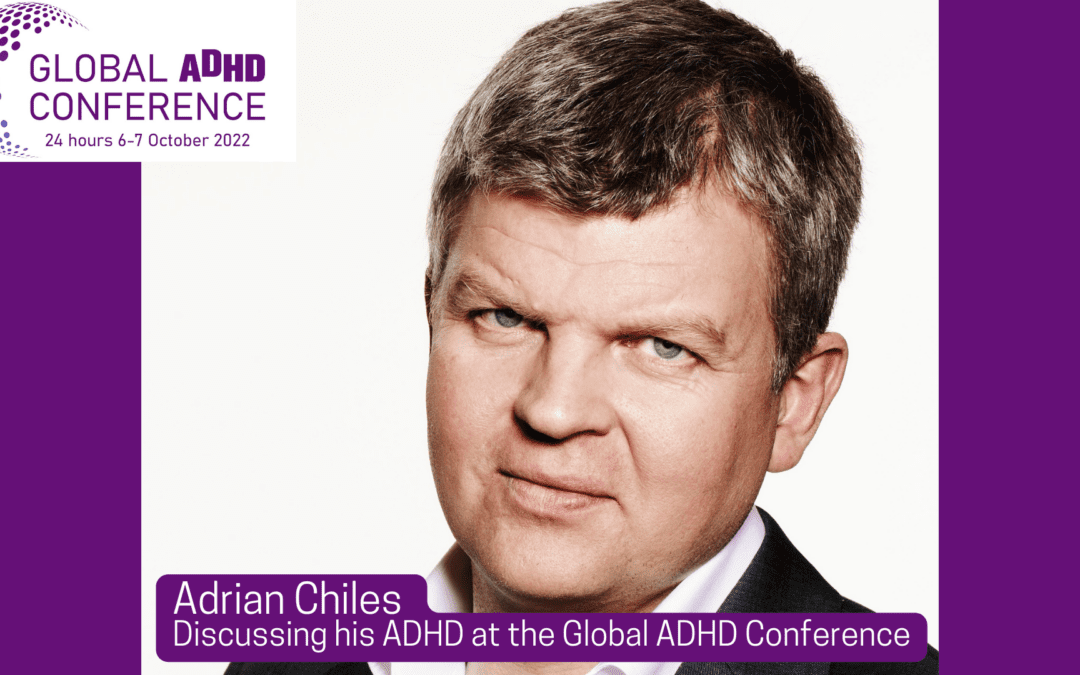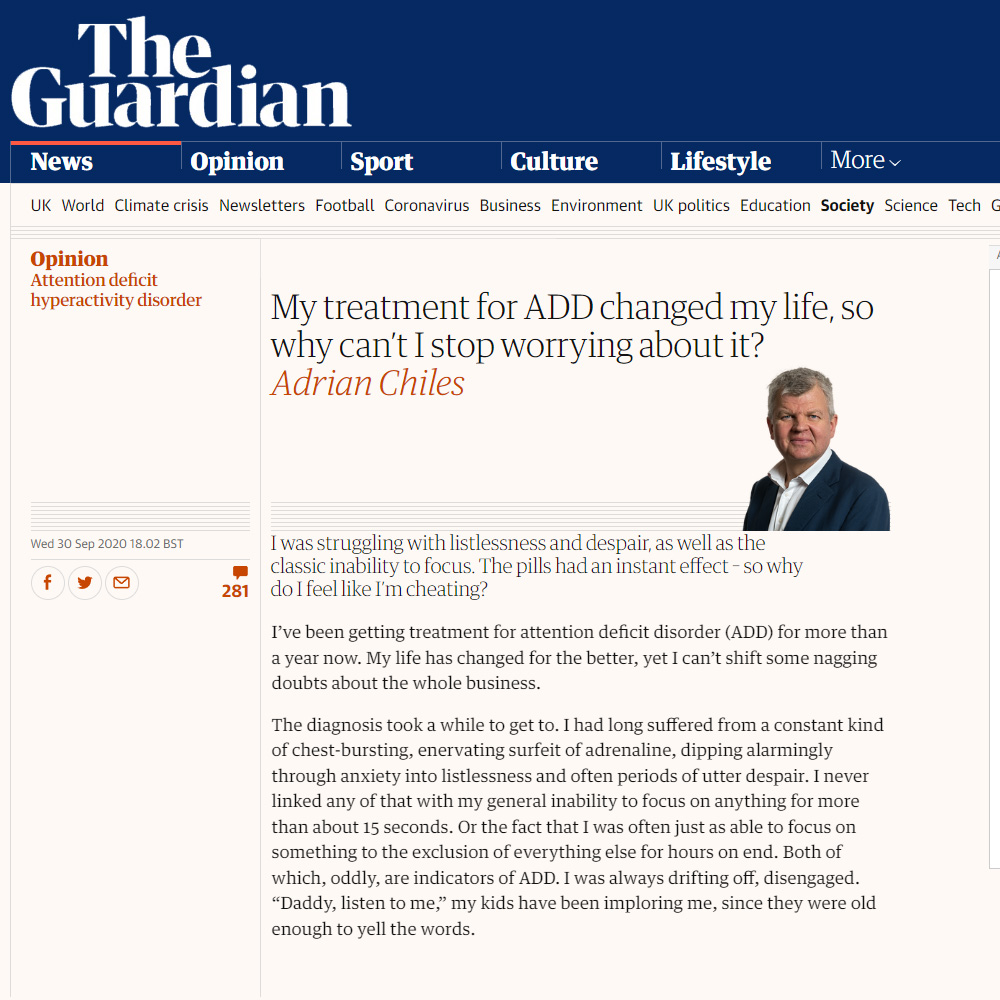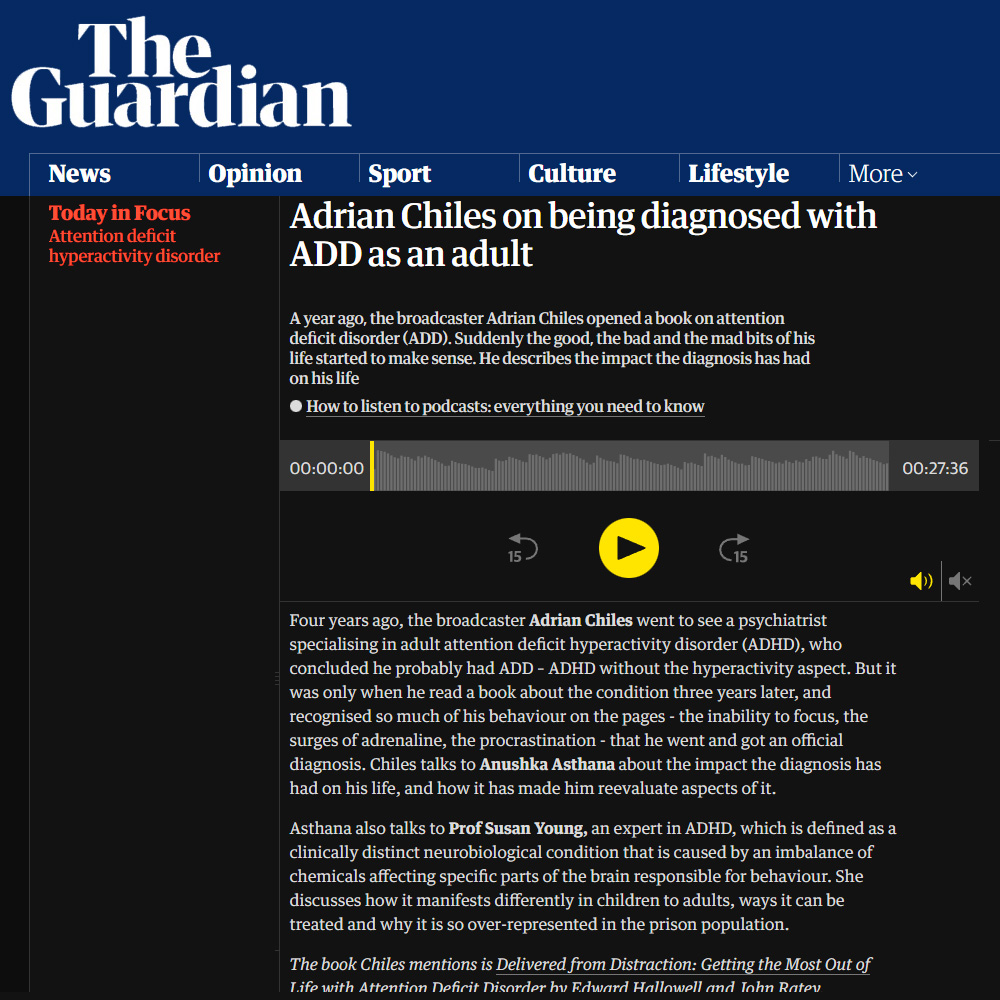Adrian Chiles (b.1967) is a UK television and radio presenter. He has presented Working Lunch (1994–2007), Match of the Day 2 (2004–2010), The Apprentice: You’re Fired! (2006–2009), The One Show (2007–2010), Daybreak (2010–2011), ITV Sport (2010–2015) and That Sunday Night Show (2011–2012). He currently works for BBC Radio 5 Live.
Adrian was originally diagnosed in 2016 by a private psychiatrist but a combination of not really understanding what ADHD was and a lost letter from his psychiatrist telling him more meant he didn’t take it further. Three years later (2019) Adrian was “really struggling” and his GP asked him if he had ever been assessed for ADHD. He said he had and the GP was able to find the original lost letter. He went back to the original psychiatrist to pick up where it had been left off. Adrian has opted for medication and talks about some of his experience of that in the 2020 self-authored Guardian article below.
Guardian (2020)
“I was struggling with listlessness and despair, as well as the classic inability to focus. The pills had an instant effect – so why do I feel like I’m cheating?” “I’ve been getting treatment for attention deficit disorder (ADD) for more than a year now. My life has changed for the better, yet I can’t shift some nagging doubts about the whole business”.
“Four years ago, a psychologist I had been seeing for some time pointed me in the direction of a psychiatrist specialising in adult attention deficit hyperactivity disorder (ADHD) who said he would need two sessions with me to make his assessment. At the conclusion of the second session he said, as I remember it, that he thought I probably had ADD – that’s ADHD minus the hyperactivity bit – but the medication might conflict with the stuff I take for hypertension, so it would need some thought. The following morning I got a bill for £1,400, so I dismissed the whole matter as private medicine gone mad and gave it not another thought”.
“On I stumbled through life with miserable vigour – fidgeting, jabbering on, taking up new hobbies/obsessions all the time. I took forgetfulness to a new level. Travelling every week, I always forgot some essentials. On several occasions I managed to pack everything I needed, only to leave the whole suitcase behind”.
“Last summer, three years on, I was really struggling. I was helped no end by a cognitive behavioural therapist called Anita Goraya who, with nearly 20 years as a GP behind her, had won my trust. After a few sessions she asked me if I had ever been assessed for ADD and, when I related the story, asked me to get the notes from the clinic. Among them was a six-page letter from the psychiatrist, clearly setting out that he was sure my issues could be traced to hitherto undiagnosed ADD, and asking me to come back and see him. The trouble is, I had never received this letter. I wish I had”.
Guardian [Podcast] (2020)
Adrian describing the symptoms that matched him: “High mental and physical energy. Coupled with extreme lassitude at times. Fast moving easily distracted mind coupled with an amazingly super focused mind at times. Unpredictability and impulsivity. Tendency towards procrastination”
“Everyone has got a bit of these things but every time I read this list my heart missed a beat. I think ‘yup, that’s me’ “
[On getting a diagnosis in his 50s] “Feel relief and bits of your life start making more sense when you go back. The danger in a lot of these things it can give you a free pass if you like. Anything you’ve done bad in your past previously, any mistakes you’ve made, you’ve still got to own them”
On impulsivity: “You suddenly find yourself buying something. Buying on Amazon. Something you didn’t know you needed or didn’t think you needed. And you have to then at that moment. You are out for a walk and you order something from Amazon. Or suddenly it will come into my mind to cook something. I’ve got to cook that. I absolutely have to cook that now for tonight. If I haven’t got the ingredients I will go out and get them. And they haven’t got them in my local shop I will go across London to the spice shop where I know they’ve got it and go and I will go and get it now at this moment. I’ve just got to have it”
On his career: “I do often wonder how. I can be absolutely miles away when I am on air doing a live interview. I don’t know how I have got away with it”, ”I just get distracted by something. Something pop up in front of me on the screen in front of me”, ”I became a very competent broadcaster. I could ad lib for hours on television or radio and just get through it. By the end at ITV, when I went to ITV sport, I sort of lost my mojo completely and the more panicked I got the less I was able to concentrate on anything. But then I started to over think everything Over concentrate on everything. I remember doing a match at Wembley. England were playing Ukraine and there was just one page of autocue for me to read. Every word just seemed like an absolute mountain to climb. So in a way it was when I really really had to focus and was under pressure then I struggled. But if I didn’t have time to think I could just let myself get on with it. I’d be alright. If that makes any sense at all. Like for example if you told me tonight you are on BBC 1 now for three hours you’ve got to ad lib I’d do it somehow but if you told me at BBC 1 tonight at 10 o’clock you will read your phone number out I’d cock it up”
On why he saw psychiatrist before diagnosis: Just feeling miserable really. The more successful I got the more miserable I got… I just felt anxious and miserable… I still really felt I needed to talk to somebody. Overwhelming I had the sense of an absolutely outstanding amount of adrenaline. I used to fanaticise in the past to put a tap, like one of those old wine boxes, just put it in my chest and just drain off the excess adrenaline….” “It was half exciting and half terrifying” “That just sort of wore me out” “That is as I understand it of ADD is partially explained by it. Constantly on this sort of roller coaster”
On self-medicating with alcohol: [In hindsight is that what you think you were doing?]: “I wasn’t doing it a kind of lose yourself get smashed kind of way. I don’t know whether it was the alcohol or that moment of calm. The beer was an excuse to sit still for a while.”
On the difference between someone without ADHD forgetting, buying on impulse, procrastinating. [What was it with you that you think took it to another level that it was very clear there was something more specific”: I think it wasn’t so much to do with the symptoms. It was to do with generally how I felt. I got to the point where there were days when I was struggling to function at all. Days where I would run around and yet achieve nothing. Other days when I just get overwhelmed and sort of ham strung. It was just getting worse and worse. Then it was the case on hearing from the psychiatrist that ADD would explain that.
On UK diagnosis: “…just completely wrong with this Is that there is no doubt in my mind that if I hadn’t been able to have afford to pay for therapy, CBT, psychologists, psychiatrists, whatever. Then I wouldn’t be treated now. I certainly wouldn’t have the medication. I don’t think. This is absolutely a middle class luxury. I don’t think somebody with my symptoms going to a GP would end up getting to see a psychiatrist and getting this diagnosis”


